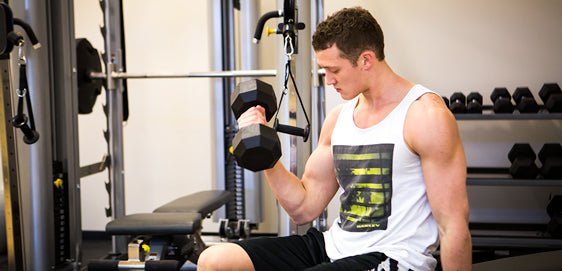You've probably heard countless anecdotes about weight lifting and its adverse effects. And you've most certainly heard even more advice tales on what not to do when it comes to lifting. But what's the truth behind these stories? Can weight lifting really be that dangerous? Here is the top five weight-lifting myths debunked.
1. The muscle will turn to fat if you stop lifting
Absolutely not. Muscle tissue doesn't magically transform into fat molecules. It's true that muscle will shrink if you don't work to maintain it, but the reason former athletes often gain weight after they stop training is because they continue to eat as though they were still burning the extra fuel at the gym. Their bodies can no longer metabolize the excess calories and, lo, the fat piles on.2. Lifting weights will make you lose flexibility
It almost seems logical that the more muscle mass you gain the lower your range of motion will become. Fortunately, it's a flawed assumption. Working the same muscle without a full range of motion will put your flexibility at risk, but by and large, you're more likely to decrease your flexibility by just sitting on the sofa. Weight lifting, when performed correctly with full motion ranges, actually increases flexibility.3. Lifting weights will make you look bulky
A lot of people particularly women are worried that adding muscle will leave them looking like pro bodybuilders. In actuality, weight lifting will make your body appear thinner, as muscle is denser than fat tissue. Bodybuilders are usually advanced full-time trainers with insanely strict diets and training programs designed to help them bulk up. To look like that would take years of hard work and the genetics of an Olympic athlete. For the rest of us, weight lifting is great for fat loss and muscle tone.4. Weight lifting is bad for your joints
Weight lifting is controlled movement that strengthens the muscles and ligaments that hold your joints together. Studies have shown that joint pain will actually decrease with a proper a weight training program. Many types of high-impact cardio, such as running, dancing, or jump rope, can have much worse long-term effects on your joints than lifting weights.5. Cardio is better for fat loss
Muscle is our most metabolically effective tissue. Lifting weights and adding muscle to your body increases the daily number of calories you burn each day, even when resting. Cardio doesn't accomplish that because it doesn't add much muscle. While it's best to do both, emphasis should always be given to weights if fat loss is your ultimate goal.
Share this article with your friends and don't forget to +1 it!


Leave a comment
All comments are moderated before being published.
This site is protected by hCaptcha and the hCaptcha Privacy Policy and Terms of Service apply.